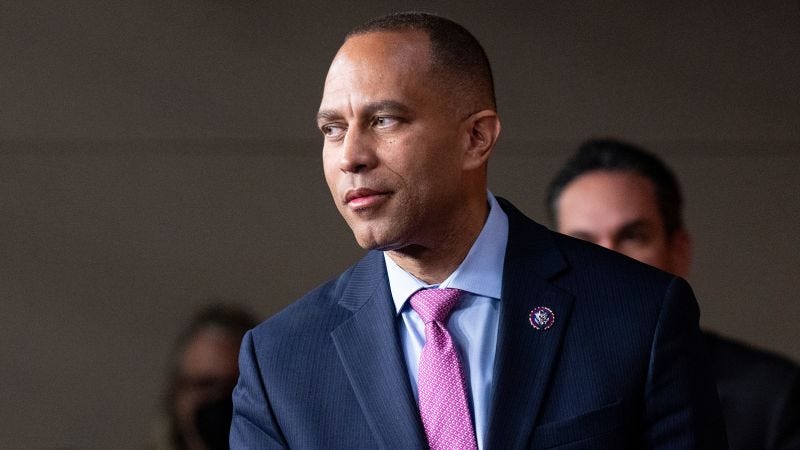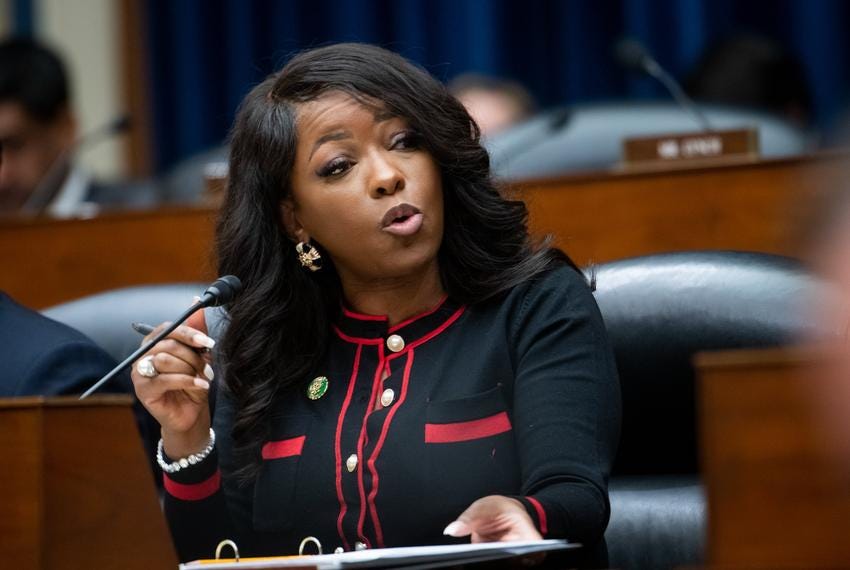Does Charlie Kirk Deserve a Holiday?
These politicians say no
Last Friday, the House of Representatives passed a resolution “honoring the life and legacy” of Charlie Kirk, the conservative activist assassinated at Utah Valley University earlier this month. The Senate had already passed its own resolution unanimously, establishing October 14 (Kirk’s birthday) as a “National Day of Remembrance for Charlie Kirk.” By contrast, Friday’s vote revealed a House divided.
Most Republicans and nearly 100 Democrats supported the measure. On the other hand, 58 Democrats voted no, another 64 voted present or didn’t show up at all, and the Congressional Black Caucus issued a scathing statement afterward calling the resolution an attempt to “legitimize Kirk’s worldview” and his “racist, harmful, and fundamentally un-American” ideas.
The split underscores how differently Kirk’s legacy is viewed even among those in the same party. While surely most Democrats opposed his right-wing ideology, that alone wasn’t enough for them to reject a resolution commemorating his life. But for those whose identities and communities bore the brunt of his rhetoric, honoring him — even in death — crossed a line. For them, the resolution read more like an endorsement.
The resolution that divided Democrats
The bipartisan resolution sponsored by Speaker Mike Johnson oscillated between two messages. First, it condemned “in the strongest possible terms” Kirk’s assassination and all forms of political violence. Second, it praised Kirk as someone who engaged in “respectful, civil discourse” and “worked tirelessly to promote unity without compromising on conviction.” The resolution honored his “steadfast dedication to the Constitution, civil discourse, and Biblical truth” and called on Americans to “recommit to respectful debate and uphold American values.”
For Democratic leadership, this created a strategic bind. Vote against it, and Republicans would attack them for failing to condemn political violence. Vote for it, and they’d be on record celebrating a man whose rhetoric many found deeply harmful. House Minority Leader Hakeem Jeffries and about 95 other Democrats ultimately voted yes but emphasized they weren’t endorsing Kirk’s views. Jeffries said, “Every single House Democrat does not endorse the views espoused by Charlie Kirk in any way, shape or form. And every single House Democrat does not endorse political violence against any person, at any time, for any reason.” He went on to say that the resolution “probably was an attempt by some on the right to try to divide the Congressional Black Caucus or divide House Democrats.”
Divide them, it did.
Rep. Jasmine Crockett didn’t mince words during a CNN appearance. The Texas Democrat said, “One of the things that I want to point out that’s not been laid out that honestly hurts my heart is when I saw the no votes, there were only two Caucasians.” Those two white Democrats were Reps. Seth Moulton of Massachusetts and Mike Quigley of Illinois. Everyone else who refused to honor Kirk identified as Black, Latino, or a person of color.
“The rhetoric that Charlie Kirk continuously put out there was rhetoric that specifically targeted people of color,” Crockett explained. “It is unfortunate that even our colleagues could not see how harmful his rhetoric was — specifically to us!” Crockett had personal experience with Kirk’s targeting. About a month before his assassination, Kirk mentioned her directly on a podcast, claiming she was somehow involved in “great replacement of white people,” the supposedly deliberate replacement of America’s white population with people of other races. She made it clear: “I’m not honoring that kind of stuff.”
“We should be clear about who Charlie Kirk was”
Before the vote, Rep. Alexandria Ocasio-Cortez took to the House floor with a speech that Republicans immediately branded as trashing Kirk. AOC called the resolution “reckless” and criticized the majority for proceeding “on a purely partisan basis” instead of crafting a bipartisan measure focused solely on condemning political violence.
“We should be clear about who Charlie Kirk was,” she declared, and then proceeded to lay out Kirk’s record: his belief that the Civil Rights Act was “a mistake,” his claim that the person to bail out Paul Pelosi’s attacker would be an “amazing patriot,” and his assertion that Jews control “not just the colleges — it’s the nonprofits, it’s the movies, it’s Hollywood, it’s all of it.” Ocasio-Cortez condemned Kirk’s assassination while refusing to sanitize his legacy. It was a position that made Republicans furious and highlighted the impossible choice Democrats faced with the vote: condemn the violence or honor the man.
The Congressional Black Caucus, which disagreed with the vote, made clear that opposing violence didn’t mean abandoning “our right to speak out against ideas that are inconsistent with our values as Americans.”
“The resolution introduced in the House to honor Charlie Kirk’s legacy is not about healing, lowering the temperature of our political discourse, or even ensuring the safety of members of Congress,” they wrote. “It is, unfortunately, an attempt to legitimize Kirk’s worldview — a worldview that includes ideas many Americans find racist, harmful, and fundamentally un-American.”
The CBC outlined specific objections: Kirk’s belief that the Civil Rights Act of 1964 was a mistake, his denial of systemic racism, his promotion of “great replacement” theory, and his claim that Justice Ketanji Brown Jackson, Michelle Obama, and Congresswoman Sheila Jackson Lee were “affirmative action picks” who lacked “the brain processing power” to “be taken really seriously.”
Many of the current members of the CBC trace their political lineage directly to the Freedom Riders, the Nashville Student Movement, and the politicians who fought to pass the very Civil Rights Act that Kirk called a mistake. They represent the institutional memory of the Civil Rights Movement. When John Lewis died in 2020, it was the CBC that carried forward his legacy of “good trouble,” and no group in Congress has more responsibility to challenge this resolution than they do.
The 15-year battle for basic recognition
The swift consensus may seem even more unearned when you consider what it took to honor Martin Luther King Jr. with a national holiday. Rep. John Conyers first introduced legislation to make King’s birthday a federal holiday just four days after his assassination in 1968. But 15 years separated Conyers’s first introduction to the creation of Martin Luther King Jr. Day.
The bill first came up for a vote in the House in 1979, on what would have been King’s 50th birthday. Despite having garnered 300,000 signatures in support, President Carter’s backing, and an endorsement from Coretta Scott King, it failed by five votes. Republicans cited the cost of an additional paid federal holiday and traditions that supposedly excluded private citizens from receiving such recognition. Stevie Wonder then wrote “Happy Birthday” in 1980 as a rallying cry for the holiday, organizing benefit concerts and appearing alongside Coretta Scott King at rallies across the country. The King Center organized a march on Washington, with an estimated 500,000 people in attendance. By 1983, they had amassed six million signatures on a petition to create the holiday.
When the bill finally passed the House that year, it faced Sen. Jesse Helms in the Senate, who tried to kill it by submitting a 400-page file framing King as a communist. Sen. Daniel Patrick Moynihan, a friend of King, threw Helm’s binder on the Senate floor and called it “filth.” The bill eventually passed, but President Reagan signed it reluctantly, saying he would have “preferred a non-holiday” in King’s honor.
The first federal Martin Luther King Day was celebrated in 1986. But it took until 2000 for all 50 states to recognize it. Arizona initially refused, and as a result the NFL took away its opportunity to host the 1993 Super Bowl, which cost the state an estimated $500 million in revenue. Arizona voters finally approved the holiday in 1992.
That’s what it took — 15 years of congressional battles, celebrity campaigns, mass demonstrations, and economic boycotts — to honor a man who preached nonviolence and died fighting for basic human dignity. By contrast, Charlie Kirk’s commemoration sailed through Congress within weeks of his death.
To be clear, this resolution for Charlie Kirk doesn’t yet create a federal holiday. But symbolic votes like this could lay the groundwork for an eventual holiday declaration. It sets the date, normalizes the observance, and signals bipartisan acceptance. In other words, the infrastructure is already there, and Trump has already said he’s open to creating a national holiday in honor of Kirk.
The Congressional Black Caucus ended its statement with a warning about Trump’s response to Kirk’s death, noting how the president had “threatened to go after the political left.” They called it “disheartening to see a tragedy used to further divide the country and suppress honest debate.”
When most members of the Congressional Black Caucus vote against honoring someone but nearly every white Democrat votes yes, what does that tell us about whose pain gets prioritized in our national memory? New York Times opinion columnist Ezra Klein called Kirk “one of the era’s most effective practitioners of persuasion.” California Governor Gavin Newsom hailed Kirk’s “passion and commitment to debate.” The Atlantic’s Sally Jenkins claimed he “argued with civility.” What happened in the House last Friday follows the same pattern. A controversial figure dies, and suddenly their most harmful positions get eclipsed by the sanitized tributes.
None of these tributes mentioned Kirk’s actual arguments — about Black Americans, about Jewish Americans, about the Civil Rights Act being a mistake. They focused instead on his method: the college tours, the debates, the engagement with students. Even that framing, though, overlooks how often Kirk used his platform to support the suppression rather than the protection of speech. He called for deporting international students who joined pro-Palestinian protests, pushed for universities to be defunded if they didn’t fire professors who taught “CRT and gender studies,” and celebrated when NPR and PBS lost funding because he disliked their content. His organization’s infamous “Professor Watchlist” (a website cataloging professors they accused of spreading “leftist propaganda”) led to Black academics receiving death threats, and Kirk called for military action against anti-ICE protestors in Los Angeles earlier this year.
It’s a pattern as old as American memory itself. We did it with Christopher Columbus, transforming a brutal conqueror into a harmless adventurer. We did it with the Confederacy, transforming slaveholders into righteous defenders of states’ rights. We’re doing it now with Kirk, transforming a promoter of white-supremacist conspiracies into a champion of respectful discourse.
The CBC put it best: “As the conscience of the Congress, the CBC has a responsibility to speak out against this on behalf of our communities.”
They can only hope that the rest of Congress will listen.











The democrats needed to put forth a gun bill named after Charlie Kirk. Again they missed the boat.
I think there’s a reason he would go to colleges and debate students vs. someone his own age that had any kind of education. The students are the ones that have likely not had enough world experience or critical thinking development to be able to truly go toe to toe with him. I’ve seen some of the clips of him “debating” students, and they’re not all in good faith. If he really wanted a fair debate, he should have gone to colleges and debated instructors, but I think he knew he would get destroyed and humiliated if he chose someone his own size to go up against.